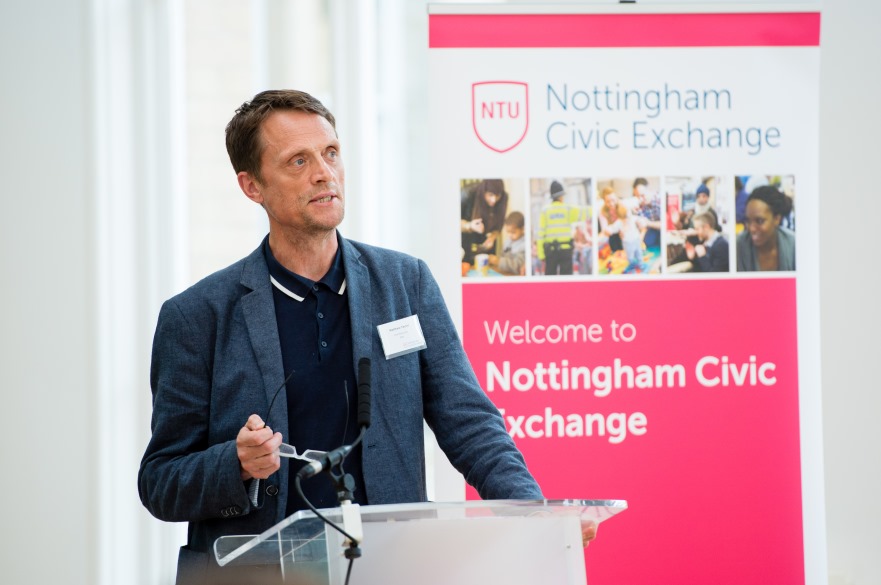Nottingham provides inspiration for RSA report addressing financial challenges faced by ordinary working families
An influential national think tank has launched a report aimed at addressing the economic challenges facing ordinary working families, building on work started in Nottingham.
By Kirsty Green | Published on 10 January 2018
Categories: Nottingham Civic Exchange;

An influential national think tank has launched a report aimed at addressing the economic challenges facing ordinary working families, building on work started in Nottingham.
The report, launched in Nottingham by the RSA today (Jan 12), is part of the Out of the Ordinary partnership programme between Nottingham Civic Exchange, based at Nottingham Trent University, and the RSA.
The programme has a focus on Nottingham and Nottinghamshire with a broader objective to influence policy at a national level.
In its report the RSA argues that economic insecurity – harmful volatility in people’s economic circumstances – has not been properly looked at and as such policymakers have frequently misdiagnosed problems and consequently provided inadequate solutions.
Report author Atif Shafique, Senior Researcher at the RSA, said: “Having a job is no longer a guarantor of economic security: more than 7 million people in working households live in poverty, wage growth lagged behind inflation for most of the last decade, and close to 8 million people in the UK live with problem debt.
“Ten years after the crash, and we need a step-change. Community, place, identity and personal responsibility all have an important role to play.
"But to help ordinary working families take ownership of their lives, local and national policy-makers must reshape policy around economic security too: we must be more strategic in when we intervene, preventing problems before they happen, and more expansive in who they help, as automation and other challenges affect people across the income spectrum."
RSA Chief Executive Matthew Taylor will chair a panel at Nottingham Conference Centre this morning which will look at the detail of the report and in particular the three long-term and three short-term recommendations it sets out.
These recommendations would reshape the way national and local governments and other agencies view and approach policy setting – particularly around issues affecting ordinary working families.
As policymakers increasingly discuss Ordinary Working Families it is important they understand the way that economic insecurity impacts their lives and that the subjective element of how people feel is important in this.
Dr Paula Black, Director of Nottingham Civic Exchange
Using three key policy areas as examples – health, housing and welfare, and labour markets – the RSA’s report demonstrates how issues could be viewed through an ‘economic insecurity lens’ to better inform actions and urges policymakers to do so as a matter of urgency.
It draws upon and reinforces the findings of initial work by Nottingham Civic Exchange (NCE) into Ordinary Working Families which was released last June.
Dr Paula Black, Director of NCE at Nottingham Trent University, said: “We noticed through our work looking at how Ordinary Working Families felt about their financial situation as well as the economic reality, that economic insecurity was a common theme and warranted further exploration.”
NCE’s report highlighted economic insecurity is a key feature of such households. It also found that how people felt about their financial situation differed from the objective measures commonly used.
Dr Black added: “As policymakers increasingly discuss Ordinary Working Families it is important they understand the way that economic insecurity impacts their lives and that the subjective element of how people feel is important in this. We are delighted to be working with the RSA on this programme of work and to be feeding the experiences of Nottinghamshire people and the profile of the area into such influential work.”
I hope to highlight the realities of economic insecurity as a single parent and the fact that insecurity is increasingly affecting people on middle incomes and it is becoming harder for each generation.
Polly Tyler, mature student at Nottingham Trent University and single parent

The RSA defines economic insecurity as “harmful volatility in people’s economic circumstances. This includes their exposure to objective and perceived risks to their economic well-being, and their capacity to prepare for, respond to and recover from shocks or adverse events.”
This captures the subjective, felt experience of the economy, because it relates to expectations and anxieties about the future. Today’s national report by the RSA supports NCE’s regional research with a further survey of more than 2,000 adults across the country. The survey found that:
- More than 20% of adults in the sample described their current financial position as ‘just about manage to make ends meet each month’.
- Thirty-two per cent of those ‘just about managing’ in the sample had annual gross household incomes above £34,000, including 12% with incomes above £48,000. Thirteen per cent had incomes below £14,000 while the majority (55%) were in the low-middle-income rage of £14,000-£34,000.
The RSA’s work also analysed government policies from 1997 to present which have been targeted at people and households on low and middle incomes, including policies relevant to those ‘just about managing’. A number of themes emerged including the positive impact of the introduction of the minimum wage (and later national living wage), limited impact of skills and programmes designed to get people back into work. It also highlighted significant inter-generational differences in insecurity affecting people who are ‘just about managing’ – with young people worse off than those who have benefitted from pension guarantees, free travel and winter fuel allowances.
The report also criticises ‘low road strategies’ taken by firms who are pursuing short term, cost-minimising strategies which often neglect to invest in up-skilling their workforce, holding back productivity growth and, in low-wage sectors, sustaining a high demand for poor quality jobs. This approach to growth is being facilitated by labour market flexibility and insecurity.
Report recommendations
As a result of the research, the RSA will make three long-term and three short-term recommendations at today’s launch at Nottingham Conference Centre.
Long term recommendations
- Pursuing an economy based on a renewed social contract (stronger relationships between business, policymakers, civic society and works and their representatives)
- Creating a virtuous cycle between economic security, good work and economic competitiveness (better understanding of the links between the economy, job quality and progression and economic security)
- Establishing economic security as a central priority for social policy
Short term recommendations
- Developing more strategic policy design (including intervening in the right way and at the right time, particularly at key moments of change)
- Reducing people’s exposure to the risks associated with economic insecurity (for example through preventative programmes, housing security and new models of welfare provision)
- Helping people, households and communities respond to economic insecurity (for example through increasing the take-up of financial entitlements, maximising the role of key institutions such as universities and healthcare services in improving economic security)
The report was discussed this morning by a panel chaired by Matthew Taylor and Polly Tyler – a mature student at Nottingham Trent University and single parent.
Polly said: “I hope to highlight the realities of economic insecurity as a single parent and the fact that insecurity is increasingly affecting people on middle incomes and it is becoming harder for each generation.”
Nottingham Civic Exchange
Nottingham Civic Exchange has been established by Nottingham Trent University to maximise research, policy and practical impact by bringing together university expertise with partners seeking to address the needs of communities. Nottingham Civic Exchange acts as a resource to look at social and economic issues in new ways. This means facilitating debate, acting as a bridge between research and policy debates, and developing practical projects at a local, city and regional level.
Visit our website - www.ntu.ac.uk/nce Contact us - notts.civicex@ntu.ac.uk Follow us - @NottsCivicEx
Notes for Editors
About Nottingham Civic Exchange
Nottingham Civic Exchange has been established by Nottingham Trent University to maximise research, policy and practical impact by bringing together university expertise with partners seeking to address the needs of local communities. NCE acts as a resource to look at social and economic issues in new ways. This means facilitating debate, acting as a bridge between research and policy debates, and developing practical projects on a citizen, city and regional level.Nottingham Trent University
- Nottingham Trent University was named University of the Year 2017 at the Times Higher Education Awards and Modern University of the Year in the Times and Sunday Times Good University Guide 2018. The award recognises NTU for its strong student satisfaction, quality of teaching, overall student experience and engagement with employers.
- Nottingham Trent University (NTU) has been awarded the highest, gold, rating in the Government’s Teaching Excellence Framework for its outstanding teaching and learning.
- NTU is one of the largest UK universities with nearly 28,000 students and more than 3,500 staff across four campuses, contributing £496m to the UK economy every year. It is one of the most environmentally-friendly universities, containing some of the country’s most inspiring and efficient award-winning buildings.
- The University is passionate about creating opportunities and its extensive outreach programme is designed to enable Nottingham Trent to be a vehicle for social mobility. NTU is the sixth biggest recruiter of students from disadvantaged backgrounds in the country and 95.6% of its graduates go on to employment or further education within six months of leaving.
- NTU is home to world-class research, winning The Queen’s Anniversary Prize in 2015 - the highest national honour for a UK university. It recognised the University’s pioneering projects to improve weapons and explosives detection in luggage, enable safer production of powdered infant formula and combat food fraud.
- With an international student population of approximately 2,600 from around 100 countries, the University prides itself on its global outlook.